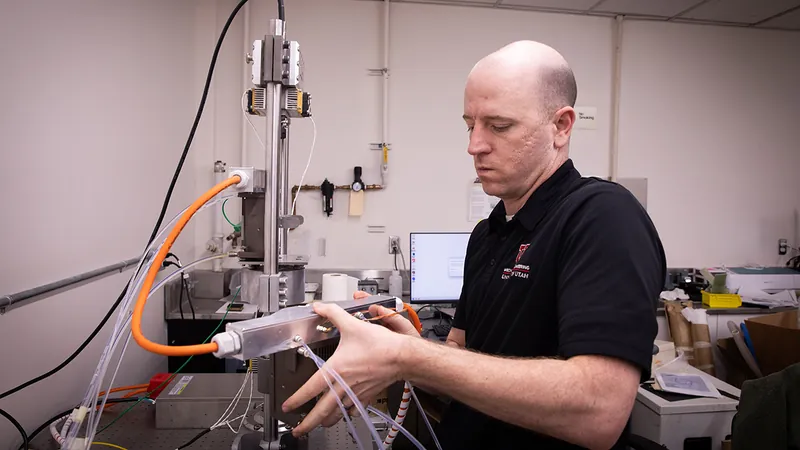
Revolutionizing Material Science: The Psylotech Micro Test System at the University of Utah
2025-04-11
Author: Siti
What is Creep and Why It Matters
In the world of mechanical engineering, the phenomenon known as "creep" is both alarming and fascinating. Creep refers to the gradual distortion of materials under sustained stress over extended periods. Although this process is often too slow to notice with the naked eye, it ultimately poses a significant risk of structural failure.
Introducing the Game-Changer: Psylotech Micro Test System
To tackle the challenges of studying creep, engineers need cutting-edge tools—and the University of Utah has provided just that with its groundbreaking Psylotech Micro Test System (µTS). Housed in the High Strain-Rate Mechanics of Materials Laboratory, led by associate professor Owen Kingstedt, this innovative load frame allows for precise application of physical forces at highly controlled temperatures.
Speeding Up Research: From Years to Days
Traditionally, researchers have relied on long-term experiments, sometimes spanning decades, to understand how materials degrade under constant load. For instance, Japan's National Institute for Materials Science has accumulated a treasure trove of data over 20 years. However, this lengthy process hampers efforts to quickly evaluate and experiment with new materials.
"If these experiments can take years, we need to assess their success potential before starting," explains Kingstedt. The Psylotech system enables surrogate experiments that can forecast outcomes within days, allowing researchers to make informed decisions before embarking on experimental journeys.
Pioneering Nuclear Energy Research
Funded by a Department of Energy initiative aimed at enhancing scientific capabilities, the Psylotech µTS is poised to support the advancement of nuclear reactor technology by refining the selection of new alloys that can endure decades of extreme heat and pressure.
Unmatched Temperature Range for Extreme Testing
What sets the Psylotech system apart is its remarkable ability to manipulate temperatures from -100°C to a scorching 1,600°C. This range is critical for simulating the harsh environments encountered in next-gen nuclear reactors, along with various aerospace and defense applications.
"We are the only academic institution in North America equipped with this unique technology," Kingstedt proudly states.
A Multifunctional Tool: The Swiss Army Knife of Material Testing
The Psylotech system is not only revolutionizing creep studies; it simplifies material testing by combining various tests within a single machine. "Typically, you would need multiple machines for different types of tests—tension, fatigue, creep—but the Psylotech does it all," Kingstedt elaborated.
Advantages of Digital Image Correlation (DIC) Techniques
Another impressive feature of the Psylotech system is its compatibility with digital image correlation (DIC) techniques. This method uses high-resolution imaging to track material deformation with unparalleled accuracy, providing insight into material behavior under extreme conditions.
Advantages for Aerospace Applications
In aerospace applications, the system is equally impressive. Kingstedt notes, "We deal with materials that endure extreme thermal and mechanical stress—think rocket nozzles and jet engines operating at thousands of degrees. With this system, we can rapidly test various material compositions to identify contenders long before they ever reach real-world applications."
Leading the Way in Advanced Materials Research
By enabling unprecedented testing capabilities, the Psylotech Micro Test System positions the University of Utah at the forefront of advanced materials research. This equipment paves the way for swift discoveries that could otherwise take decades, further solidifying the university's standing as a leader in material innovation.


 Brasil (PT)
Brasil (PT)
 Canada (EN)
Canada (EN)
 Chile (ES)
Chile (ES)
 Česko (CS)
Česko (CS)
 대한민국 (KO)
대한민국 (KO)
 España (ES)
España (ES)
 France (FR)
France (FR)
 Hong Kong (EN)
Hong Kong (EN)
 Italia (IT)
Italia (IT)
 日本 (JA)
日本 (JA)
 Magyarország (HU)
Magyarország (HU)
 Norge (NO)
Norge (NO)
 Polska (PL)
Polska (PL)
 Schweiz (DE)
Schweiz (DE)
 Singapore (EN)
Singapore (EN)
 Sverige (SV)
Sverige (SV)
 Suomi (FI)
Suomi (FI)
 Türkiye (TR)
Türkiye (TR)
 الإمارات العربية المتحدة (AR)
الإمارات العربية المتحدة (AR)